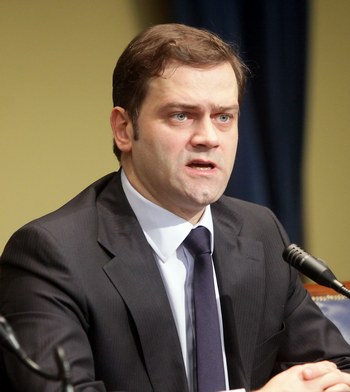- Serbia
Get to know Serbia
- Citizens
Culture and science
Health services
Pension and disability insurance
- Business
Employment
Economy
- Media
- Government
- Contact
Keep in touch
Contact form
Back
Keepin touch
Whether you have a question, comment, suggestion or any problem in the purview of the government, send us your message and we will try to respond as soon as possible. If your problem is not in our purview, we will forward your message to the relevant institution.
Q:
A:
Agreement on integrated control of administrative crossings to preserve Serbia’s national interest
Belgrade,
4 December 2011
Head of the Serbian team for dialogue with Pristina Borislav Stefanovic today stressed that the agreement on integrated control of administrative crossings will preserve Serbia’s national interest.
Speaking at a press conference upon his return from Brussels, where the agreement was reached yesterday, Stefanovic explained that the document is in line with UN Security Council Resolution 1244 and the Serbian Constitution.
He remarked that the solution is not an ideal one, but is the best possible in the given circumstances.
The concept of joint control of administrative crossings was not imposed on us. It was initiated by Belgrade, and not the EU or Pristina, Stefanovic underlined, announcing that the agreement will be presented on the government website.
The crossings will be under joint control of EULEX, the Serbian and Kosovo police forces, representatives of the Serbian Ministry of Finance and Kosovo customs witnesses, Stefanovic explained, noting that the agreement does not refer to any fiscal or revenue-related provisions.
This solution fulfils Resolution 1244 because some of our personnel will be re-stationed in Kosovo-Metohija, while Kosovo customs officers will only be granted the role of witnesses, he added.
Stefanovic called upon citizens in the north of Kosovo to remove the barricades, as well as appealed to KFOR to exercise restraint.
He explained that the agreement on joint management of administrative crossings primarily envisages that the crossings will be with single checkpoints, and not double, for instance, there will no longer be two checkpoints Rudnica and Jarinje, but only Jarinje.
The agreement affirms the special status of Jarinje and Brnjak, he observed, adding that EULEX will have executive mandate at these crossings, which means that it will be tasked with all customs-related matters.
The role of the Serbian police and officers from the Serbian Ministry of Finance will be the same as it had been at Rudnica, while, as far as Pristina is concerned, this task will be performed by EULEX, he specified, stressing that there will be no symbols of the so-called Kosovo state at these crossings.
He said that the implementation of the agreement will be gradual, noting that the deadline of 26 December does not refer to this agreement, but to the implementation of the agreement on the freedom of movement, which is a separate issue.
Stefanovic announced that once the government adopts this agreement and all by-laws are passed, it will be forwarded to the Parliament. After that, work will continue in implementation groups in dialogue with Pristina, in which Serbs from Kosovo are also participating.
It is important for Belgrade to be confirmed that the situation in the field will be taken into consideration, which was affirmed by EU mediator Robert Cooper, who said that implementation must take into account the use of different licence plates and documents.
Stefanovic concluded that after the signing of this agreement, Serbia’s foreign policy position has been improved.
He remarked that the solution is not an ideal one, but is the best possible in the given circumstances.
The concept of joint control of administrative crossings was not imposed on us. It was initiated by Belgrade, and not the EU or Pristina, Stefanovic underlined, announcing that the agreement will be presented on the government website.
The crossings will be under joint control of EULEX, the Serbian and Kosovo police forces, representatives of the Serbian Ministry of Finance and Kosovo customs witnesses, Stefanovic explained, noting that the agreement does not refer to any fiscal or revenue-related provisions.
This solution fulfils Resolution 1244 because some of our personnel will be re-stationed in Kosovo-Metohija, while Kosovo customs officers will only be granted the role of witnesses, he added.
Stefanovic called upon citizens in the north of Kosovo to remove the barricades, as well as appealed to KFOR to exercise restraint.
He explained that the agreement on joint management of administrative crossings primarily envisages that the crossings will be with single checkpoints, and not double, for instance, there will no longer be two checkpoints Rudnica and Jarinje, but only Jarinje.
The agreement affirms the special status of Jarinje and Brnjak, he observed, adding that EULEX will have executive mandate at these crossings, which means that it will be tasked with all customs-related matters.
The role of the Serbian police and officers from the Serbian Ministry of Finance will be the same as it had been at Rudnica, while, as far as Pristina is concerned, this task will be performed by EULEX, he specified, stressing that there will be no symbols of the so-called Kosovo state at these crossings.
He said that the implementation of the agreement will be gradual, noting that the deadline of 26 December does not refer to this agreement, but to the implementation of the agreement on the freedom of movement, which is a separate issue.
Stefanovic announced that once the government adopts this agreement and all by-laws are passed, it will be forwarded to the Parliament. After that, work will continue in implementation groups in dialogue with Pristina, in which Serbs from Kosovo are also participating.
It is important for Belgrade to be confirmed that the situation in the field will be taken into consideration, which was affirmed by EU mediator Robert Cooper, who said that implementation must take into account the use of different licence plates and documents.
Stefanovic concluded that after the signing of this agreement, Serbia’s foreign policy position has been improved.
-
 Belgrade, 22 January 2025
Belgrade, 22 January 2025Egypt one of Serbia’s closest partners on international stage
-
 Belgrade, 9 July 2024
Belgrade, 9 July 2024Support for 104 associations in diaspora that preserve Serbian language, culture
-
 Belgrade, 15 April 2024
Belgrade, 15 April 2024Competition for StarTech grants open until 31 May
-
 Belgrade, 2 October 2023
Belgrade, 2 October 2023Serbia respects Resolution 1244 and will do everything to preserve peace
-
 Belgrade, 13 September 2023
Belgrade, 13 September 2023Day of Serbian Unity to be celebrated outside borders of Serbia, Republika Srpska for the first time
-
 Belgrade, 8 August 2023
Belgrade, 8 August 2023RSD 24.2m in state aid paid out to citizens affected by storm
-
 Belgrade, 17 June 2023
Belgrade, 17 June 2023Belgrade is doing everything to preserve peace in Kosovo and Metohija
-
 Belgrade, 15 June 2023
Belgrade, 15 June 2023Slovenia will continue to support Serbia on its way to EU
-
 Belgrade, 5 May 2023
Belgrade, 5 May 2023Emergency measures, tightening of conditions for possessing weapons
-
 Belgrade, 3 May 2023
Belgrade, 3 May 2023Three days of mourning in Serbia over tragedy at Vladislav Ribnikar primary school


